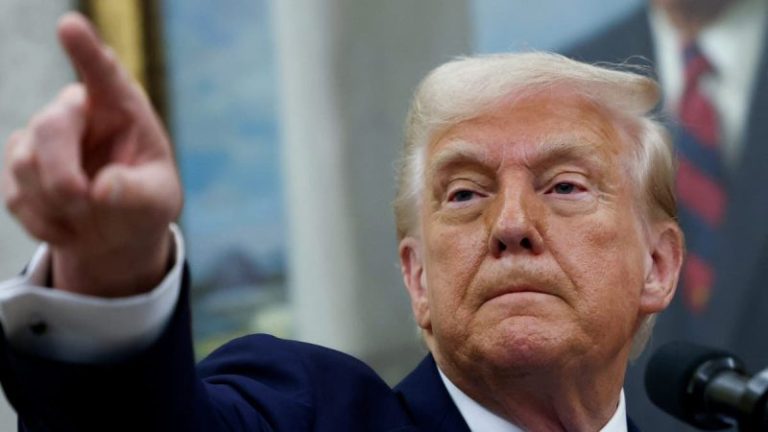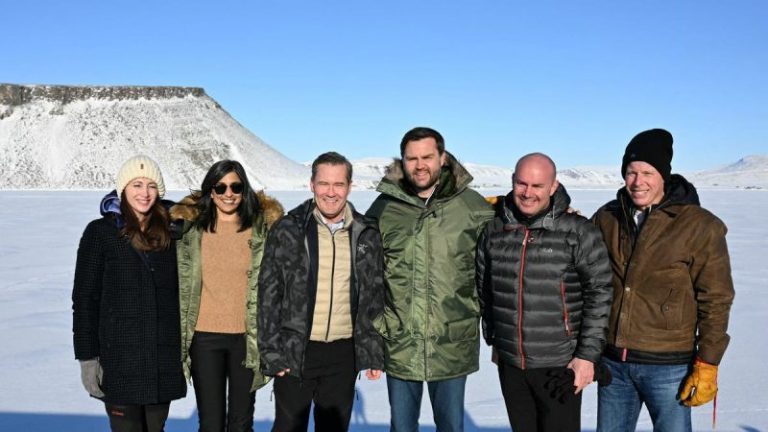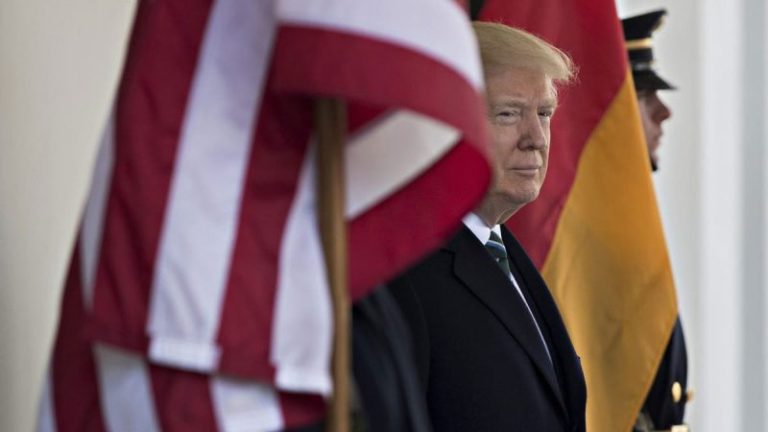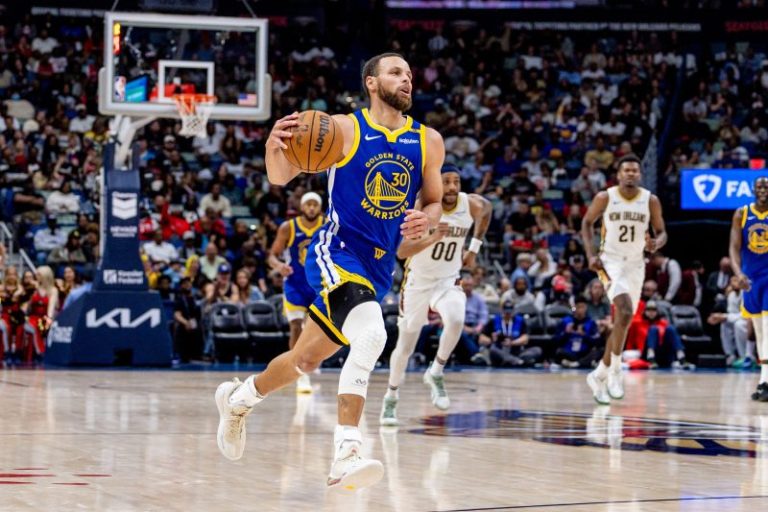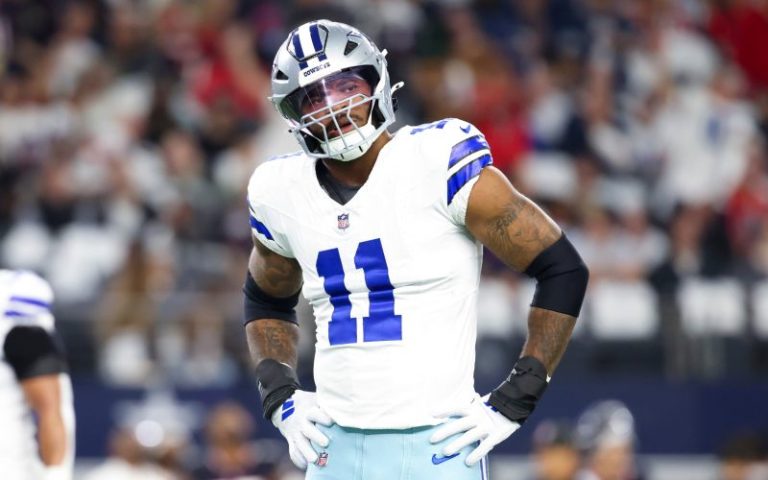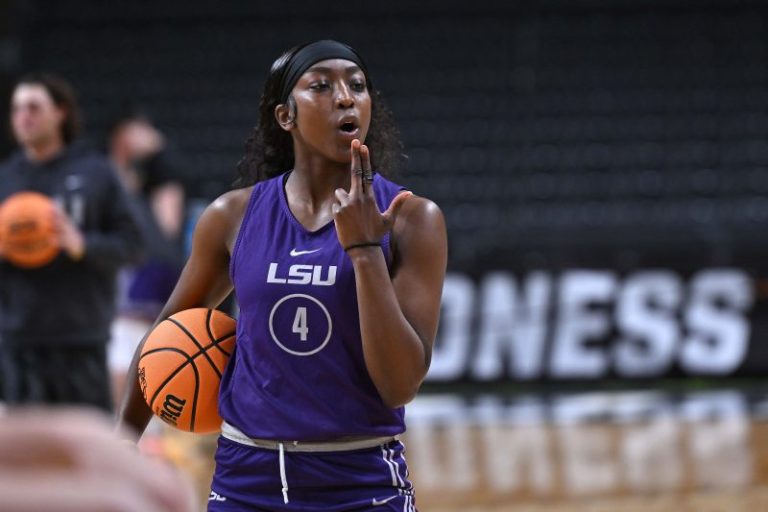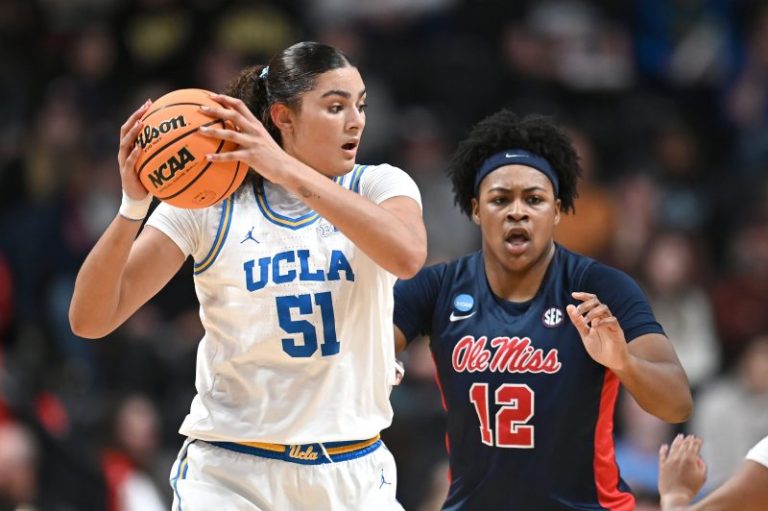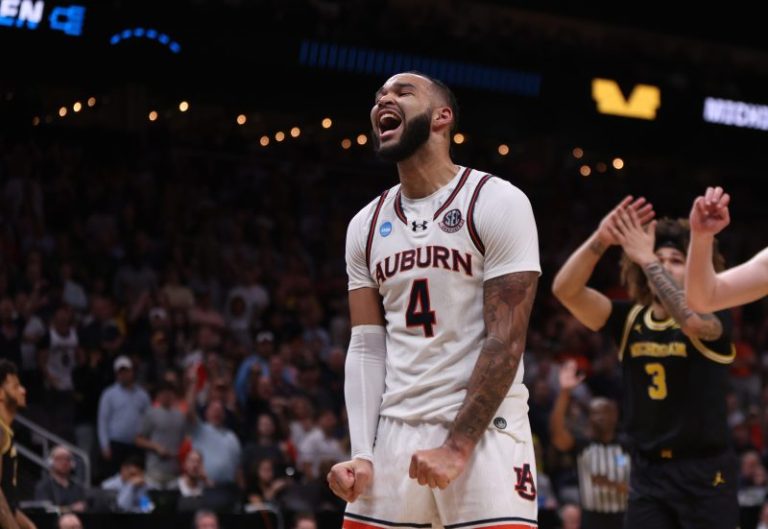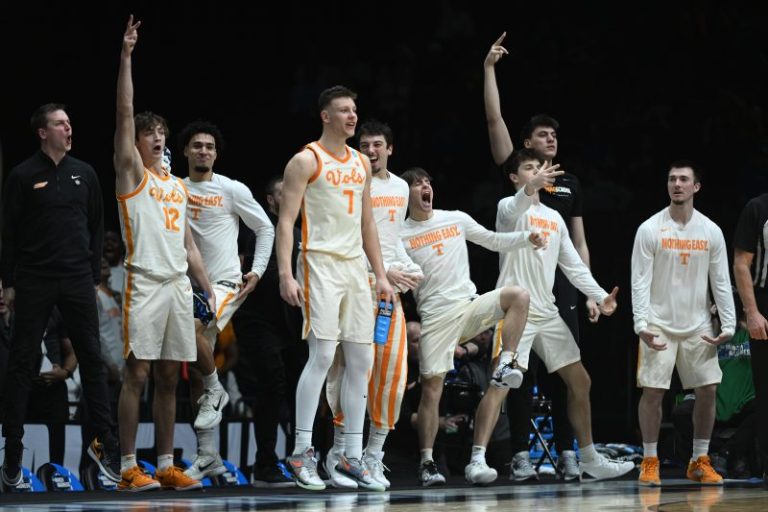The Auburn Tigers proved to be too much for the Michigan Wolverines in the second half of their men’s March Madness game on Friday.
The Tigers earned the 78-65 victory, pulling away in the second half after a tight opening 20 minutes to reach the Elite Eight in Atlanta. Three players scored more than 18 points apiece for the Tigers, led by SEC Player of the Year Johni Broome. Auburn is the tournament’s No. 1 overall seed and the SEC’s regular-season champion.
It was the Tigers’ defense that caused trouble for the Wolverines, who were left scoreless for long stretches of the second half.
‘I just thought we played great defensively with unbelievable effort and energy,’ Auburn coach Bruce Pearl told CBS Sports after the game.
The Wolverines were making their 19th Sweet 16 appearance, having reached the round in each of their last six NCAA appearances. Michigan was led by Danny Wolf, who scored 20 points and shot 50% from the field.
USA TODAY Sports followed the top moments from Friday’s game:
Auburn vs. Michigan men’s basketball score
Auburn beats Michigan 78-65 in the Sweet 16 contest Friday in Atlanta. The Tigers finished the game on a 33-14 scoring run to advance to their third Elite Eight.
Auburn’s Johni Broome led the way with 22 points and 16 rebounds, while Tahaad Pettiford came off the bench to score 20 points and Denver Jones also hit 20. It is the first time in Auburn’s tournament history that it has had three different players score 18 or more points.
Auburn vs. Michigan highlights
No. 1 seed Auburn beat No. 5 seed Michigan 78-65. Watch the video for best action from the game.
Johni Broome stats today
Johni Broome has a double-double with 22 points and 16 rebounds for the Tigers. It was Broome’s fourth game with a double-double (10 points and 11 rebounds) in the first half this season.
Danny Wolf stats today
Danny Wolf has a team-high 20 points and six rebounds for Michigan in the second half. With six minutes left in the second half, Wolf was the only double-digit scorer for the Wolverines.
Michigan State will play Auburn
As a result of Auburn winning its Sweet 16 matchup, the Tigers will play the Michigan State Spartans in the Elite Eight.
‘(The Spartans) do it the right way and they will be an honorable opponent,’ Pearl told CBS Sports. ‘We have 24 hours to get ready for them.’
Smith played for the Spartans (1987-91). He now works as a basketball analyst for Turner Sports.
The Spartans are 30-6 and were Big 10 regular-season champions.
Auburn starting lineup
Guard Denver Jones
Guard Miles Kelly
Guard Chad Baker-Mazara
Forward Johni Broome
Center Dylan Cardwell
Michigan starting lineup
Guard Tre Donaldson
Guard Rubin Jones
Guard Nimari Burnett
Forward Daniel Wolf
Center Vladislav Goldin
What time is Auburn vs. Michigan basketball today?
March Madness continues Friday with the Sweet 16 matchup between the No. 1 seeded Auburn Tigers and the No. 5 seeded Michigan Wolverines. The action tips off at 9:39 p.m. ET
Where to watch Auburn vs. Michigan: TV, streaming coverage
TV channel: CBS
Live stream: Paramount+ and Fubo (Fubo offers a free trial subscription)
Watch March Madness with Fubo
What channel is March Madness on?
Men’s NCAA Tournament games will be broadcast across CBS, TBS, and TruTV channels. You can also watch Sweet 16 action via these streaming options: Max and Sling for games carried on TNT, TBS, TruTV. Games carried on CBS are available on Fubo, which offers a free trial subscription to new users.
Watch March Madness games on CBS with Fubo
Auburn vs. Michigan odds and betting line
The Auburn Tigers are favorites to beat the Michigan Wolverines, according to BetMGM odds as of Friday, March 28.
Spread: Auburn (-8.5)
Moneyline: Auburn (-425); Michigan(+325)
O/U: 155.5
Auburn vs. Michigan predictions and picks
Jeremy Cluff: Michigan 81, Auburn 77
Craig Meyer: Auburn 82, Michigan 70
TaylorJones: Auburn 72 Michigan 63
Two of our three experts are expecting Auburn to take care of business and advance to the Elite Eight. AZ Central’s Jeremy Cluff, however, is calling for Michigan to pull off the upset and for the game to go over the 153.5-point total. USA TODAY’s Craig Meyer and Auburn Wire’s Taylor Jones both have the Tigers covering the 8.5-point spread and are taking the under. — Nick Brinkerhoff
Auburn vs. Michigan all-time head-to-head record, history
The Auburn Tigers and Michigan Wolverines have faced each other twice in their history and have split the series 1-1.
Have the Auburn Tigers ever won a national championship?
The Auburn Tigers have never won a national championship. They have reached as far as the Final Four in 2019. The program also claims two Elite Eight appearances (1986, 2019) and six Sweet 16 appearances.
Michigan Wolverines national Championship, NCAA Tournament history
The Michigan Wolverines boast one national championship, having won it all in 1989. They have appeared in the finals seven times and the Final Four eight times.
March Madness championship odds
Odds to win the men’s NCAA national championship, according to BetMGM odds as of Friday, March 28. Here’s a full look at the favorites to win the men’s tournament:
Duke (+180)
Florida (+275)
Houston (+550)
Auburn (+575)
Alabama (+1200)
Tennessee (+2000)
Texas Tech (+2200)
Michigan State (+2500)
Kentucky (+8000)
Michigan (+9000)
Ole Miss (+10000)
Purdue (+12500)
Predictions: Three No. 1 seeds make Final Four
This feels like the best chance to see the first all-No. 1 seed Final Four since 2008. However, while Duke rolled in its first two games, Auburn was tested by Creighton, Houston fought off a furious comeback by Gonzaga and Florida got all it could handle from Connecticut.
Three of the No. 1 seeds have shown cracks, and one of them ends up missing out in San Antonio: the top overall seed, Auburn. — Jordan Mendoza
March Madness 2025 expert predictions
USA TODAY experts set their picks ahead of the NCAA Tournament. Here is who they picked before the madness.
Jordan Mendoza
Full bracket
Final Four: Michigan State, Florida, Duke, Houston
Final: Florida vs. Houston
National champion: Houston
Paul Myerberg
Full bracket
Final Four: Auburn, St. John’s, Duke, Tennessee
Final: Auburn vs. Duke
National champion: Duke
Eddie Timanus
Full bracket
Final Four: Auburn, Florida, Duke, Houston
Final: Florida vs. Duke
National champion: Florida
Dan Wolken
Full bracket
Final Four: Michigan State, Florida, Duke, Houston
Final: Florida vs. Duke
National champion: Duke
2025 Men’s March Madness Printable Bracket
Here is your printable March Madness bracket.
Click for your 2025 NCAA Tournament printable bracket
Men’s March Madness bracket: Dates, times, TV, results and scores
All times Eastern
Tuesday, March 18
First Four games
South region: No. 16 Alabama State def. No. 16 St. Francis, 70-68
South region: No. 11 North Carolina def. No. 11 San Diego State, 95-68
Wednesday, March 19
First Four games
East region: No. 16 Mount St. Mary’s def. No. 16 American, 83-72
Midwest region: No. 11 Xavier def. No. 11 Texas, 86-80
Thursday, March 20
Round of 64 games
South region: No. 9 Creighton def. No. 8 Louisville, 89-75
Midwest region: No. 4 Purdue def. No. 13 High Point, 75-63
East region: No. 3 Wisconsin def. No. 14 Montana, 86-66
Midwest region: No. 1 Houston def. No. 16 SIU-Edwardsville, 78-40
South region: No. 1 Auburn def. No. 16 Alabama State, 83-63
Midwest region: No. 12 McNeese State def. No. 5 Clemson, 69-67
East region: No. 6 BYU def. No. 11 VCU, 80-71
Midwest region: No. 8 Gonzaga def. No. 9 Georgia, 89-68
Midwest region: No. 2 Tennessee def. No. 15 Wofford, 77-62
West region: No. 10 Arkansas def. No. 7 Kansas, 79-72
South region: No. 4 Texas A&M def. No. 13 Yale, 80-71
West region: No. 11 Drake def. No. 6 Missouri, 67-57
Midwest region: No. 7 UCLA def. No. 10 Utah State, 72-47
West region: No. 2 St. John’s def. No. 15 Omaha, 83-53
South region: No. 5 Michigan def. No. 12 UC San Diego, 68-65
West region: No. 3 Texas Tech def. No. 14 UNC-Wilmington, 82-72
Friday March 21
Round of 64 games
East region: No. 9 Baylor def. No. 8 Mississippi State, 75-72
East region: No. 2 Alabama def. No. 15 Robert Morris, 90-81
South region: No. 3 Iowa State def. No. 14 Lipscomb, 82-55
West region: No. 12 Colorado State def. No. 5 Memphis, 78-70
East region: No. 1 Duke def. No. 16 Mount St. Mary’s, 93-49
East region: No. 7 Saint Mary’s def. No. 10 Vanderbilt, 59-56
South region: No. 6 Ole Miss def. No. 11 North Carolina, 71-64
West region: No. 4 Maryland def. No. 13 Grand Canyon, 81-49
West region: No. 1 Florida def. No. 16 Norfolk State, 95-69
Midwest region: No. 3 Kentucky def. No. 14 Troy, 76-57
South region: No. 10 New Mexico def. No. 7 Marquette, 75-66
East region: No. 4 Arizona def. No. 13 Akron, 93-65
West region: No. 8 UConn def. No. 9 Oklahoma, 67-59
Midwest region: No. 6 Illinois def. No. 11 Xavier, 86-73
South region: No. 2 Michigan State def. No. 15 Bryant, 87-62
East region: No. 5 Oregon def. No. 12 Liberty, 81-52
Saturday, March 22
No. 4 Purdue def. No. 12 McNeese, 76-62
No. 10 Arkansas def. No. 2 St. John’s, 75-66
No. 5 Michigan def. No 4 Texas A&M, 91-79
No. 3 Texas Tech def. No. 11 Drake, 77-64
No. 1 Auburn def. No. 9 Creighton, 82-70
No. 6 BYU def. No. 3 Wisconsin, 91-89
No. 1 Houston def. No. 8 Gonzaga, 81-76
No. 2 Tennessee def. No. 7 UCLA, 67-58
Sunday, March 23
No. 1 Florida def. No. 8 UConn, 77-75
No. 1 Duke def. No. 9 Baylor, 89-66
No. 3 Kentucky def. No. 6 Illinois, 84-75
No. 2 Alabama def. No. 7 Saint Mary’s, 80-66
No. 4 Maryland def. No. 12 Colorado State, 72-71
No. 6 Ole Miss def. No. 3 Iowa State, 91-78
No. 2 Michigan State def. No. 10 New Mexico, 71-63
No. 4 Arizona def. No. 5 Oregon, 87-83
Thursday, March 27
East and West region Sweet 16 games, Time and TV channel TBD
No. 2 Alabama vs. No. 6 BYU | 7:07 p.m. | CBS
No. 1 Florida vs. No. 4 Maryland | 7:39 p.m. | TBS
No. Duke vs. No. 4 Arizona | 9:39 p.m. | CBS
No. 3 Texas Tech vs. No. 10 Arkansas | 10:09 p.m. |TBS
Friday, March 28
Midwest and South region Sweet 16 games, Time and TV channel TBD
No. 6 Ole Miss vs. No. 2 Michigan State | 7:09 p.m. | CBS
No. 2 Tennessee vs. No. 3 Kentucky | 7:39 p.m. | TBS
No. 1 Auburn vs. No. 5 Michigan | 9:39 p.m. | CBS
No. 1 Houston vs. No. 4 Purdue | 10:09 p.m. | TBS
Saturday, March 29
East and West region finals, Time and TV channel TBD
Sunday, March 30
Midwest and South region finals, Time and TV channel TBD
Saturday, April 5
Final Four
Game 1: 6:09 p.m. on CBS
Game 2: 8:49 p.m. on CBS
Monday, April 7
National championship game: 8:50 p.m. on CBS
When does the Final Four start?
On the men’s side, the Final Four is scheduled for Saturday, April 5. The NCAA championship game will take place two days later on Monday, April 7. All games will played at the Alamodome in San Antonio, Texas.
For the women, the Final Four will be played on Friday, April 4 at Amalie Arena in Tampa, Florida. The championship game will be Sunday at 3 p.m. at the same venue.
Women’s March Madness schedule
Here is the women’s schedule:
First Four: March 19-20
First round: March 21-22
Second round: March 23-24
Sweet 16: March 28-29
Elite Eight: March 30-March 31
Final Four: Friday, April 4, 7 p.m. ET on ESPN, hosted at Amalie Arena in Tampa. Second game starts 30 minutes after first game ends.
NCAA championship game: Sunday, April 6 at 3 p.m. ET on ABC, hosted at Amalie Arena in Tampa.
Women’s March Madness printable bracket
Click here to print your 2025 NCAA women’s tournament printable bracket
This post appeared first on USA TODAY

